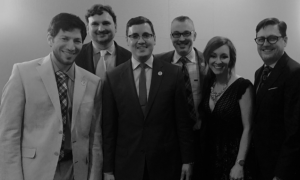Overview of the NeuroRhinology-Advanced Rhinology and Skull Base Surgery Fellowship

During the NeuroRhinology-Advanced Rhinology and Skull Base Surgery fellowship, the fellow is expected to further refine an existing knowledge base by continued reading and by taking an active role in the education of other learners. Assigned readings are provided on a weekly basis from “Rhinology – Diseases of the Nose, Sinuses and Skull Base” edited by Kennedy and Hwang.
NeuroRhinology fellows rotate with each of the five faculty members in a rotation model. The fellows are rotated monthly: one fellow on the Rhinology (Senior/Ebert/Kimple) service and the other on Skull Base (Thorp) service. Elective time is also provided to allow fellows to focus on specific skills of areas of interest as well as for research
Weekly schedules vary with each service. However, the fellows will have their own clinic one half day per week as well as time to schedule cases from their clinic. Weekly rhinology conferences are held with the participation for the fellows and residents on-service. Conferences serve to review the literature and discuss interesting cases. Call responsibilities consist of 3 days per month and one holiday per year.
The fellows actively participate in a wide array of surgical procedures. The operative experience includes primary and revision endoscopic sinus surgery, endoscopic and open frontal sinus surgery, endoscopic septoplasty, orbital decompression, as well as endoscopic CSF leak and encephalocele repair. The fellows also participate in expanded endoscopic cases of midline and the anterior skull base, including surgery of the pituitary, suprasellar cistern, olfactory groove, clivus/upper spine and infratemporal fossa. In addition, the fellows have an opportunity to perform open approaches for tumor pathology of the skull base.
Fellows are provided feedback on a daily basis after cases and clinic visits. Formal evaluations are performed biannually of the fellowship-training program, fellowship faculty, as well as of the fellows. Fellows are also required to self-evaluate on a biannual basis. Case logs are monitored and reviewed twice a year.
The NeuroRhinology fellows at UNC interact in a very collaborative manner. They rotate between 2 distinct services and do not compete for any cases or clinic coverage. We have a strong commitment to team with excellent camaraderie, which requires helping each other take care of necessary add on cases that arise during the week.


